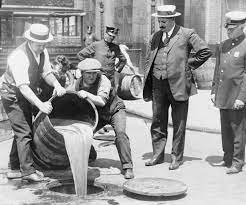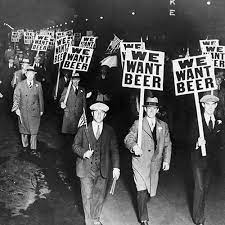>
IT DID HAPPEN HERE!
The Eighteenth Amendment, Prohibition, America's last and most catastrophic experiment in 'moral' governance, was passed during the tumultuous aftermath of World War I following decades of dedicated political agitation by its largely pietistic Protestant proponents. Rather than cleansing the nation's body and soul, as intended, it resulted instead in a decade and a half of bitter and costly social and cultural warfare during which the personal choices and behavioral patterns of large segments of society were criminalized, political corruption and disrespect for the law grew exponentially, ultimately resulting in the rise of organized crime on an unprecedented scale.
If the 'Roaring Twenties' are remembered at all it is for the romanticized excesses of flappers, bobbed hair, speakeasies, Gatsby-like parties and the ubiquitous arrival of Model Ts, culminating in the Stock Market Crash of 1929 and the ensuing the Great Depression. What is most often left out of that picture is the darker reality of an America in the throes of a 'moral crisis', much like today's. The enormous economic consequences of industrialization, coupled with the growing presence of seemingly 'alien' immigrants concentrating in rapidly growing cities, prompted fears that the traditional values and power structures of an older, rural, white, Protestant America were being lost. These early "replacement" anxieties, promoted in small-town America, were only enhanced by the impact of the evolving media of the day--Hollywood films, radio and national newspapers and the spread of secular values they represented.
In response, standard bearers of the newly triumphant 'moral majority' of that day were quick to seize the stage, crusading not just for increasingly strict Prohibition enforcement, particularly against the now illegal drinking habits of the urban working class and rural poor, but in favor of overtly racist and nativist immigration laws, anti-Semitic and anti-Catholic social policies as well as the maintenance of racial-segregation policies aimed at further preserving traditional values and purifying the nation. The results: growing disrespect for the justice system and governmental authority; a vast expansion of smuggling and organized-crime activities; further marginalization of minorities; and increased breakdown of social order. And a decade and a half later: an enormous effort to gain full repeal in the Twenty-First Amendment.
Perhaps nothing epitomized the intemperate zeal of the moral crusaders better than the famous trial of John T. Scopes in Dayton, Tennessee, in 1923. There, in the full glare of national publicity, a high-school biology teacher was convicted of breaking a state law forbidding the teaching of Darwinian evolution. Long taught as a warning against the dangers of ignorance and intolerance, the "Monkey Trial" still stands as an unsettling and chilling reminder that today's highly politicized school board battles over curricular controls, library books and newly enacted state laws forbidding the teaching of 'Critical Race Theory' or other controversial topics that might unsettle students' minds have deep national roots.
Nearly ninety years after Prohibition's repeal in 1933, the nation is again on the verge of responding to a whipped-up sense of 'moral crisis' by embarking on another doomed experiment in moral cleansing: this time by the legalistic mechanism of ceding control of women's hard-earned reproductive rights to the variable mercies of individual states. A half-century of settled constitutional law carefully balancing individual rights and social responsibility in a pluralistic society is in grave danger of being dismantled in the name of what a passionate, politically and religiously conservative minority of citizens choose to define narrowly as "moral" behavior.
This impending de-nationalizing of a fundamental right is as fully a radical act as the ill-fated Eighteenth Amendment, with both equally predictable and unintended consequences. Like Prohibition, its impact will clearly be greatest on those with limited resources; in this case, women unable to travel to obtain qualified or safe medical treatment near their homes. Harsh laws and penalties for abortion providers, or those willing to help women end unwilling or unwanted pregnancies, are already on the books in several states, ready to criminalize individuals for their personal choices. Indeed, the impulse to punish lawbreakers, even women themselves for having abortions, is already surfacing in state legislatures. As one writer has recently pointed out, "people who oppose abortion will, in fact, be dictating abortion policy in dozens of states" driven in many cases by the absolutist logic that all abortions are acts of murder. (Jane Coaston, "Punishing Women Who Have Abortions," New York Times, May 15, 2022.)
On the national level, conflict between states forbidding or permitting abortion will inevitably be magnified, creating enormous inequities as well as economic costs and social disparities. As President Biden predicted in commenting on the leaked Supreme Court draft opinion overruling Roe v. Wade, one step down this road will only embolden advocates for turning back a number of recently recognized, but contested, individual rights. A 'moral crisis' will have been hardened into a truly political crisis contributing only to the further destructive polarization of American society.
What Prohibition actually teaches, one legal scholar concluded, is that "when purged of an individual right, people carry on as if they still retained the right notwithstanding state action to the contrary. Confidence in governmental authority erodes, and respect for the rule of law falls to a nadir." (Jesse D.H. Snyder, "What Prohibition Teaches About Guns and Abortion," Hasting Women's Law Journal, Summer 2017, p. 151.)
We've been down that road before, and it's clearly a dead end.







